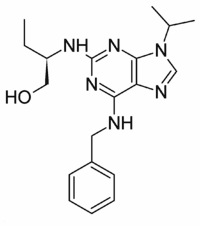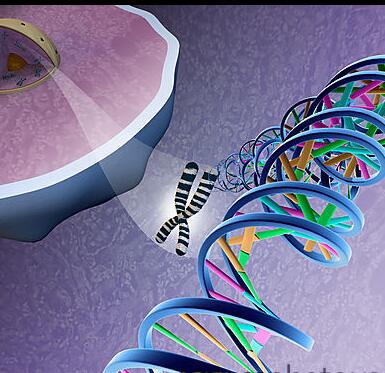All AbMole products are for research use only, cannot be used for human consumption.

Roscovitine (Seliciclib or CYC202) is a cyclin-dependent kinase (CDK) inhibitor that preferentially inhibits multiple enzyme targets including CDK2, CDK7 and CDK9, which alter the growth phase or state within the cell cycle of treated cells. Cyclin-dependent kinases (cdk) play an essential role in the intracellular control of the cell division cycle (cdc). Seliciclib has been shown to inhibit RNA polymerase II-dependent transcription and down-regulation of the protein MCL1. Roscovitine inhibits in vitro M-phase-promoting factor activity and in vitro DNA synthesis in Xenopus egg extracts. It blocks progesterone-induced oocyte maturation of Xenopus oocytes and in vivo phosphorylation of the elongation factor eEF-1. Roscovitine inhibits the proliferation of mammalian cell lines with an average IC50 of 16 microM. At 20 microM, Roscovitine induced apoptosis in 21 of 28 B-CLL samples and was equally effective in zap-70-positive or -negative samples. Caspase-3 was cleaved in B-CLL cells exposed to Roscovitine and the pancaspase inhibitor z.VAD.fmk-blocked Roscovitine-induced apoptosis. Roscovitine induced a block in G1 earlier than that induced by aphidicolin. S-phase synchronized cells treated with roscovitine were arrested at a 4C DNA content at the G2/ M transition. Finally, cells in metaphase were insensitive to roscovitine. The purified CDK/cyclin kinase activities of late G1 and early M arrested cells were inhibited in vitro by roscovitine.

J Virol. 2024 Apr 24.
Japanese encephalitis virus NS1 and NS1’ proteins induce vimentin rearrangement via the CDK1-PLK1 axis to promote viral replication
Roscovitine (Seliciclib) purchased from AbMole

Discov Med. 2017 Apr;23(127):221-234.
N-methyl-D-aspartate Receptors Mediate Epilepsy-Induced Axonal Impairment and Tau Phosphorylation via Activating Glycogen Synthase Kinase-3β and Cyclin-dependent Kinase 5
Roscovitine (Seliciclib) purchased from AbMole
| Molecular Weight | 354.45 |
| Formula | C19H26N6O |
| CAS Number | 186692-46-6 |
| Solubility (25°C) | DMSO 60 mg/mL |
| Storage |
Powder -20°C 3 years ; 4°C 2 years In solvent -80°C 6 months ; -20°C 1 month |
| Related CDK Products |
|---|
| (E/Z)-Zotiraciclib citrate
(E/Z)-Zotiraciclib citrate is a potent CDK2, JAK2, and FLT3 inhibitor. |
| Abemaciclib metabolites M2
Abemaciclib metabolite M2 (LSN2839567) is a metabolite of Abemaciclib, acts as a potent CDK4 and CDK6 inhibitor, with IC50 values of 1.2 and 1.3 nM, respectively. |
| CDK9-IN-1
CDK9-IN-1 is a novel, selective CDK9 inhibitor, with an IC50 of 39 nM for CDK9/CycT1, it can be used for the research of HIV infection. |
| XO44
XO44 (PF-6808472) is a broad-spectrum covalent kinase probe. |
| ML 315
ML 315 is a selective dual inhibitor of CDK and DYRK with IC50s of 68 nM and 282 nM, respectively. |
All AbMole products are for research use only, cannot be used for human consumption or veterinary use. We do not provide products or services to individuals. Please comply with the intended use and do not use AbMole products for any other purpose.


Products are for research use only. Not for human use. We do not sell to patients.
© Copyright 2010-2024 AbMole BioScience. All Rights Reserved.
